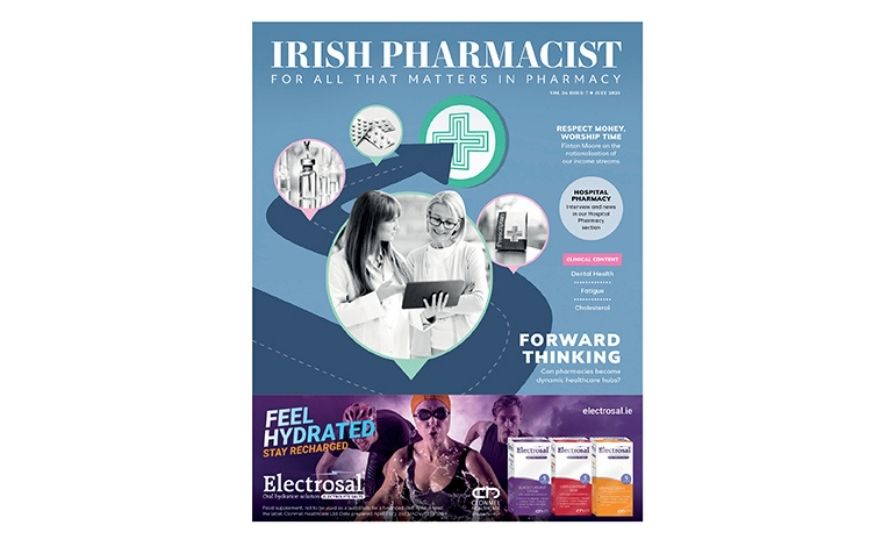Fintan Moore offers some practical suggestions on how to improve the GMS scheme and easte the pressure on primary care
I recently came across something I wrote five years ago, suggesting a way to improve the operation of the GMS scheme. Given that implementing positive change in the HSE is like manoeuvring an oil tanker in a sea of treacle after an engine failure, I had faint hope to see any of my musings become reality, but what I wrote at the time was:
‘What if the GMS scheme was run the same way as the LTI scheme?’ Then, instead of GPs having to use the green GMS forms, they could issue prescriptions on a standard prescription form. Pharmacists could dispense using that standard form, and print-off a receipt like an LTI receipt using the patient’s GMS number.
The patient could then sign the receipt, so verification is taken care of. The patient will only be signing for what is actually dispensed, so the whole problem of how to manage ‘owings’ ceases to exist. If a GP faxes or phones-in a prescription near the end of a month, we will be actually able to claim for the item using the receipt, instead of being left hanging for the piece of green paper.
Another major advantage of this system would be the positive impact on available GP time. Prescriptions could be automatically written for six months for routine items such as OCPs, blood pressure and cholesterol medication, rather than for three months, as is standard in most practices.
Changes in medication initiated by hospitals or consultants could be handled without the patient needing to get the hospital prescription rewritten by the GP onto a green form, thereby eliminating the Hospital Emergency scheme. Patients under the care of psychiatric clinics could go directly from the clinic to the pharmacy, without the need for transcription of their clinic prescription by the GP.
Given that one of the greatest challenges facing the HSE is the shortage of GPs, this change in how the GMS
scheme operates could dramatically improve the landscape. Could this work?
Obviously, nothing changed between 2016 when I wrote this, and March 2020, but suddenly when Covid hit, we had all sorts of changes. A lot of the change was driven by the fact that GPs were going into bunkers and only working by phone, so healthmail was born. This was an improvement on what I had suggested, but shared the fundamental idea that the antique ‘green form’ could be abolished. Some of the other ideas were also introduced as Covid measures.
Now that the Covid pandemic is gradually ending, apart from its final kick that is spiking case numbers, attention can turn to all the other crises besetting the health service. I live in hope that pharmacists will be included in some of the solutions. The bottleneck in GP availability is here to stay for the long-term, so the smart move by the HSE would be to see where we can ease the pressure.
Klopp shows some cop-on
Liverpool’s manager Jurgen Klopp consistently manages the difficult feat of being a likeable top-flight football manager. In a professional world that is often dominated by ego-driven individualists, he comes across as a thoughtful and humane kind of guy. The vaccination rates among Premiership players and staff are depressingly low, but Liverpool has bucked that trend, with a 99 per cent vaccination rate among players and staff.
Klopp’s approach seems to have filtered through the club. His attitude was summed-up in the following comment: “Where did I get the knowledge from that I think it makes sense to get the vaccine? I called doctors that I’ve known for years and I asked them: ‘What should I do?’ That’s how I usually work: When you don’t know, you call a specialist and the specialist tells you. That’s why I took the vaccination because I am in an age group [54] where it is not that easy any more, the virus could be tricky, and I was really happy when I could get it.
The specialists out there say the vaccination is the solution at the moment.”
This common sense reasoning is a welcome change from the all-too-prevalent gobshite anti-vax sentiment to be seen in too many professional athletes, especially soccer players. The combination of being under-educated and overpaid, with too much time on their hands, seems to have generated a bubble mentality in which too many of these guys can get sucked down a rabbit-hole of nonsense on social media, while having the wealth and support network to be insulated from the consequences of their decisions.
Unfortunately, many young people can be influenced by these ‘role models’, and the consequences for them and their families will often be far more damaging. The situation in the US in some sports shows unusual fault-lines in opinion. As a rough generalisation, Republican voters are less likely to be vaccinated than Democrats. However, within the black community, which tends to vote Democrat, there is a deep-rooted distrust of government when it comes to medical advice, based on historical abuses perpetrated against them. So within the sport of basketball in particular, there is a very polarised debate between the pro-vaccine and anti-vaccine players and coaches.
It further illustrates how lucky we are in Ireland to have a broad consensus in favour of vaccination.
CONTRIBUTOR INFORMATION

Fintan Moore graduated as a pharmacist in 1990 from TCD and currently runs a pharmacy in Clondalkin.
His email address is: greenparkpharmacy@gmail.com.







